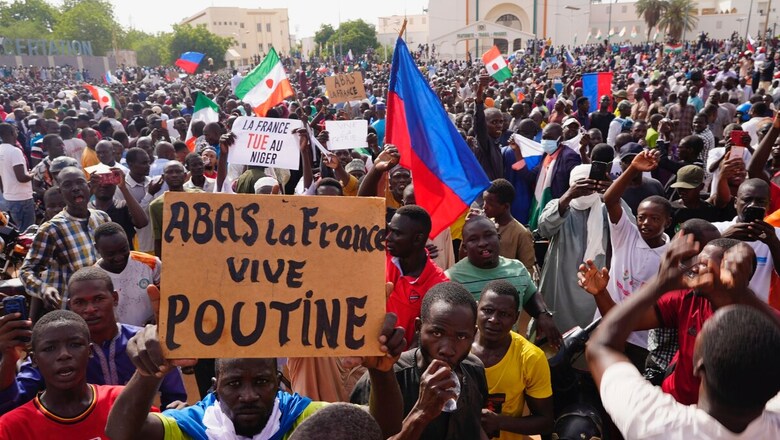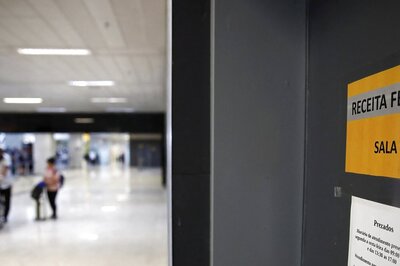
views
On July 26, 2023, a coup d’état occurred in Niger when the country’s presidential guard detained President Mohamed Bazoum, and presidential guard commander General Abdourahamane Tchiani proclaimed himself the leader of a new military junta, shortly after confirming the coup a success. This was the fifth military coup d’état since the country gained independence from France in 1960, and the first since 2010.
The coup was widely condemned by the United States and the country’s former colonialist France, and by the West African regional bloc, the Economic Community of West African States (ECOWAS), the latter of which threatened military intervention against the junta. This led to the 2023 Nigerien crisis after the coup. The West African bloc ECOWAS stands ready to intervene militarily in Niger, should diplomatic efforts to reverse a coup there fail, a senior official told army chiefs who were meeting in Ghana on Thursday to discuss the details of a standby force.
It is in this context certain questions need to be answered including a general understanding of the Sahel region of which Nigeria is a part, the repercussions of a coup under international law, the link of countries like France to the dispute, and the possible way forward.
In simple terms, the Sahel region comprising countries like Nigeria, Burkino Faso, Chad, Mali, Sudan, and Cameroon etc. has been the epicentre of African conflicts dominated by coups, jihadist insurgencies, and local armed conflicts. All this is accompanied by low human development, inadequate health facilities, poor education, and unemployment.
Coming back to Nigeria, which has faced Boko Haram’s terrorism in the past is, at present, seized under a military coup which is a danger to a democratic structure. Though democracy is not a perfect system to reflect human aspirations, out of all the available governance mechanisms, democracy is way ahead of others. The countries that are under autocratic rule can understand the value of democracy. Primarily after World War II, when the decolonisation movement had started, many Asian and African countries were made independent. Initially, most of these countries adopted democracy as a mode of governance. However, within a few years, the democratic system fell and an autocratic system was placed instead, especially in Nigeria.
Though there is a cardinal rule that international law should not interfere with municipal law, in urgent cases, due to violations of preliminary values of civilization, the international community and law takes positive step to solve the problem. The United Nations Charter had adopted Article 2(7) as a principle of non-intervention as the customary principle of international law but the exceptions are laid down in Chapter VII and Article 51 of the same charter that deals with the right of self-defence. International Court of Justice in a series of cases, from Corfu Channel to Nicaragua, has been reaffirming these principles. Many times, when a military coup occurs in different countries, the new government suspends all basic human rights of the common people. International law still looks at military coups from the point of that country’s Constitution. However, if human rights are violated by the military regime (which is very often), it attracts the international community for rapid action.
International law vests this rapid action rights with the United Nations Security Council. This council has the power either by itself or can authorise countries to take action against any suffering of the people. The second option for stopping arbitrary military action is by humanitarian interventions. Several times, these steps are highly criticized for their misuse by powerful nations, which brings the discussion to the role of countries like France in this dispute.
The primary interest of France in the Sahel region is the presence of huge deposits of mineral resources. At the same time, several French nationals and companies have set up their places of business in these regions. Thus, any sort of economic upheaval brought through the coup directly affects their interests in the region.
At a larger level, efforts need to be made to counter violent extremist programs, enhancing the rule of law and access to essential public goods, given the grim economic condition of Nigeria, and creating mechanisms to address legitimate grievances and governance issues in the region which requires focusing on the need for poverty alleviation through employment, education, and healthcare provisions. To achieve the above-said aims, the emphasis must be on a human needs perspective to conflict resolution. Such an approach focuses on the needs for identity, security, recognition, participation, dignity and justice.
Abhinav Mehrotra is Assistant Professor and Dr Biswanath Gupta is Associate Professor at OP Jindal Global University. Views expressed in the above piece are personal and solely that of the author. They do not necessarily reflect News18’s views.


















Comments
0 comment